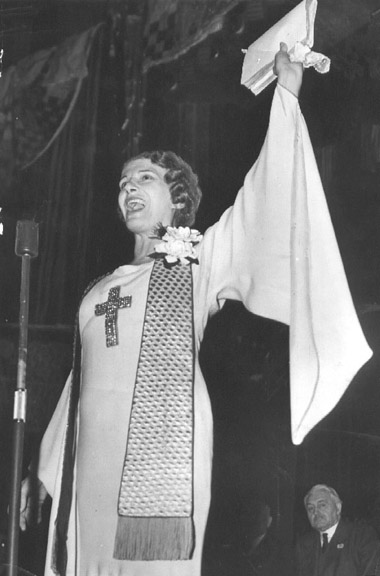
This post is borne out of a need to briefly share my view of women serving in ministry. I am an unabashed Egalitarian. I believe women (and men) can and must serve the Church (global and local) in any capacity that they are called to as ministers of the good news of Jesus in the power of God’s Holy Spirit. This in no way sets aside, ignores, or rejects the teachings of the Scripture on the subject. I take the Scriptures with all seriousness. However, what are the markers by which we interpret Scripture are paramount for me (and what interpretive methodologies we use matter). This is not a post that discusses (or exegetes) specific texts (I’ve done some of that elsewhere), but one that is orienting for my approach to the subject in light of the over-arching orientation of Scripture.
I find three basic orienting testimonies in Scripture address this issue for myself:
- The Spirit testifies. This testimony is the most basic to my understanding that whatever the Spirit testifies to must be affirmed. This functions in the way that the Spirit testified for the early church concerning full Gentile inclusion in every way (Acts 15). The same Spirit that is poured out on men is poured out on women. The same Spirit that empowers for witness, the same Spirit that calls to ministry, the same Spirit that sanctifies, anoints, secures and gifts towards the full maturation of the Church until we all come into the fullness of Christ. [Just such a trajectory is proposed in J. C. Thomas, ‘Women, Pentecostals, and the Bible: An Experiment in Pentecostal Hermeneutics’, Journal of Pentecostal Theology 5 (1994), pp. 41-56].
- The creation testifies. While complementarians say they appeal to creation order, they actually appeal to the order of the Fall in Genesis 3. However, Genesis one and two address women as co-equals in the call to care for the earth and accomplish the purposes of God in the earth. This is the account pre-Fall and should take precedence as the “order” in which God made things precedes the “order” into which things descended in sinfulness. Redemption, thus, is oriented by creation toward new creation in the midst of fallen-ness, but does not take its first cue from fallen-ness.
- The eschaton testifies. While many seem to order their lives by the “now” this disregards the “then” of what God is doing to set all things to rights in the cosmos. The eschaton (or “end”) of all things points to the end of relationship structures as conceived between husband and wife (according to Jesus being “neither married nor given in marriage” Matthew 22:30). It points to the end for which we were created. This end is that for which the Church is oriented in Christ Jesus. Yet we do not simply await that end, but we begin even now to live in light of that end even as we still marry and are given in marriage. Our continuing in marriage is under the banner of Christ’s soon coming kingdom when such structures must be conformed to his intent in everything–that is, in mutual submission, and in living in wholeness towards God and world in redemption.
While I in no way anticipate that this is persuasive for those who hold alternative views, it is at least a look inside my own approach (for whatever that is worth). Related to this (and briefly discussing such things), here is a 13 minute podcast I did three years ago tackling the idea of women in ministry (along with a few other things). It never aired, so I requested permissions to post it myself here.
For a helpful exegetical reading of Paul’s writings on the subject, see Craig Keener, Paul, Women & Wives: Marriage and Women’s Ministry in the Letters of Paul (Baker Academic, 1992).